Latest NEWS
- Aswat Masriya, the last word
- Roundup of Egypt's press headlines on March 15, 2017
- Roundup of Egypt's press headlines on March 14, 2017
- Former Egyptian President Hosni Mubarak to be released: lawyer
- Roundup of Egypt's press headlines on March 13, 2017
- Egypt's capital set to grow by half a million in 2017
- Egypt's wheat reserves to double with start of harvest -supply min
- Roundup of Egypt's press headlines on March 12, 2017
Sabahi: Brotherhood-SCAF pact will fail to determine next president

Potential presidential candidate, Hamdeen Sabahy - Aswat Masriya
In an exclusive interview with Aswat Masriya, potential presidential candidate Hamdeen Sabahi said that the agreement between the Muslim Brotherhood (MB) and the ruling Supreme Council of Armed Forces (SCAF) will fail to generate a president who is accepted by the people.
Sabahi indicated that not one political force will have the last word on who gets to rule “instead, the people will elect a leader who represents their interest and persona; a leader who they can trust, not a production of a pact, such as that of the ruling military and MB”.
“A president of that kind is a deal-president not one who enjoys consensus”, Sabahi said, adding that such a proposal is unacceptable post-revolution.
Meanwhile, the MB's Freedom and Justice Party, has not yet announced what candidate they will be backing, but indicated that he must be of religious background. The potential presidential candidate went on to explain that “although who the MB will back is an important factor; it is not the only defining factor”.
Sabahi indicated that the general social atmosphere is “moderate, not radical”, and thus suggested that there may be an inclination to elect a moderate candidate to create a balance with the Islamist-dominated parliament in place.
Agreeing that Egypt is a conservative society, Sabahi insisted that this will not necessarily lead to the victory of religion-based political parties or sectarian division.
Arguing that the landslide victory of Islamic forces in parliamentary elections was a product of direct interaction with the streets, not “religious preaching”, Sabahi added that a candidate who interacts with the people is more likely to assume power than a “celebrity candidate” who speaks well of the revolution but does not interact with the people.
“The people are in need for a candidate who will provide them with decent living conditions, must respect religion, but not necessarily of religious origin”, Sabahi said.
Sabahi explained that running for president is an extension of his struggle to fulfill the demands of the revolution, and insisted that electing a president who believes in the revolution will help fulfill these demands.
On funding his campaign, Sabahi claimed he was the least funded of all presidential candidates, and pointed that he depends on donations made by his acquaintances. “We want an Egyptian president funded by Egyptian money”, he said.
Sabahi insisted on the importance of supervising the funding of presidential campaigns to ensure transparency, calling for the establishment of an observatory institution consisted of state forces and civilians to observe the processes, to avoid “foreign funding”.
Sabahi suggested that non-governmental organizations be supervised, criticizing however the authorities’ recent raid on organizations describing it as “an attack of political motives for they were concerned with human rights”. He criticized the ruling military for the way the raid was managed to “taint the reputation of these organizations, before a verdict is reached in their question of funding.”
Sabahi accused the military council of extending the transitional period and held it accountable for the deaths, injuries and those who were humiliated in peaceful protests. He described the shortcomings as the responsibility of authorities and called for the fair persecution of all those responsible for the deaths.
Sabahi insisted that the rest of Egypt’s transitional period should not be managed by the SCAF after allegations of negligence or direct responsibility for shortcomings.
On Egypt’s relationship with Israel, Sabahi said that if elected president, “We will not spoil Israel whatsoever. The former regime worked in the interest of Israel, not the Palestinians or even Egyptians.”
Additionally, he promised that he will halt the controversial gas deal, lift the blockade on Gaza and support the resistance movement because based on United Nations (UN) law; occupied people have the right to resistance.
However, Sabahi said he will not cut relations with Israel as Egypt is abided by the Camp David accord, “but if an Egyptian solider is attacked on the border, relations will be cut”.
Sabahi insisted “My aim will not be the abolishment of the Camp David accord, but its exhaustion; the accord is a humiliation that I do not wish for Egypt”. He indicated that his intention to run for president does not include fighting Israel but is based on his will to fight poverty and ignorance.
He did not dismiss however the possibility of amending the Camp David accord signed by former president Mohamed Anwar Al-Sadat in 1979.










